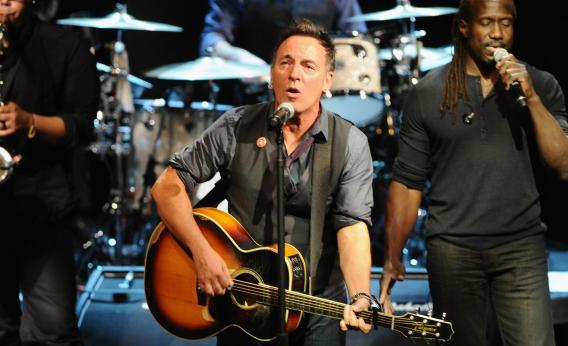Bruce Springsteen might inspire others to privilege rock over the rest of pop, but he does no such thing himself. That’s what we learned during his surprising keynote speech from the South by Southwest Music Festival last week. It’s worth watching the sweeping 50 minute address in full—Springsteen is insightful, funny, and (perhaps unsurprisingly) not a bad writer—and you can do so via the embed below. Update, March 20, 2012: The speech has been removed from YouTube but you can still watch over at NPR.
While the bulk of his speech focuses on his heroes from folk and rock, Springsteen’s opening makes clear that that’s only because he’s taking some time to tell his particular story, and they’re the heroes of the particular genres he works in. He explains that he got class consciousness from The Animals, straightforward storytelling from country music, the importance of live performance from the “still underrated” funk godfather James Brown. (He was also “inspired by the passion in Elvis’s pants.”) After he plays a few bars of “We Gotta Get Outta This Place” (around 23:05 in the clip above), he reveals, “That’s every song I’ve ever written.” (Of course, it’s a good song.)
Elsewhere he gives a shoutout to Public Enemy and states that his early influences represent only part of the American musical tradition. While many have lamented the way pop music has splintered its way into hundreds of different camps, Springsteen celebrates pluralism. Around 6:20 he rattles off a few dozen different subgenres and minigenres; the only one that seems to flummox him is Nintendocore.
While the sound of Springsteen’s latest album embraces everything from drum machines to Mariachi horns to gospel singing and rap—it’s a sound that’s drawn criticism in some circles—Springsteen’s speech made clear that that was no unconscious choice or the work of some tinkering producer. Unlike Dave Grohl, who took the occasion of his Grammy win to suggest that creativity “is not about what goes on in a computer,” Springsteen declared that “Purity of human expression and experience is not confined to guitars, to tubes, to turn tables, to microchips. There is no right way, no pure way, of doing it. There’s just doing it.”
Later, when he talks about Woody Guthrie, Springsteen acknowledges that even his own self-expression and artistry isn’t completely pure. (Of course, he’s not the first to do so.) He says that when he discovered Woody Guthrie part of him wanted to become just like him, to trade fame for self-sacrifice and political action, but another part of him liked being a star too much. As he says earlier, “We live in a post-authentic world.”
In a fitting end to his all-embracing speech, he closes by singing Guthrie’s “This Land Is Your Land,” inviting everyone in the crowd to sing along. He only sings one verse, but later that night he completed the gesture, inviting everyone from Jimmy Cliff to Joe Ely to Arcade Fire to Tom Morello to join him. If only he’d asked a Nintendocore band to join in.
Previously:
How Much Does Rolling Stone Love Bruce Springsteen?
Did You See This? Bruce Springsteen and Neil Young Cover “Sexy and I Know It”
